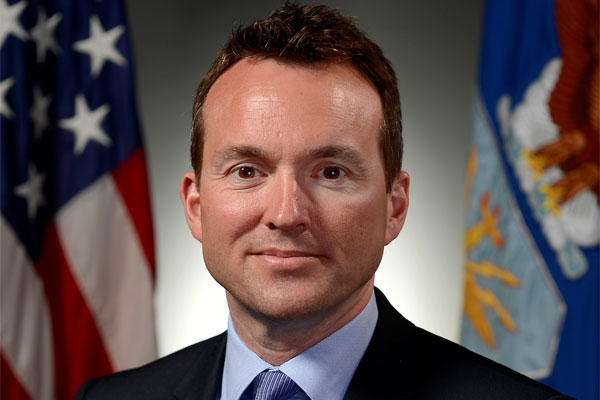After months of delay, Eric Fanning finally was given a confirmation hearing Thursday by the Senate on his historic nomination by President Obama to become the first openly gay Army secretary.
Fanning's sexual orientation never came up in the course of his testimony before the Senate Armed Services Committee (SASC), and the hearing instead focused mainly on the Army's struggle to meet commitments in a period of downsizing.
Fanning, who previously served as acting Air Force secretary and chief of staff to Defense Secretary Ashton Carter, appeared headed to an easy confirmation by the full Senate.
Obama nominated Fanning, 47, from Kalamazoo, Michigan, last September but Sen. Pat Roberts, R-Kansas, had put a "hold" on the process to protest the administration's plan to close the Guantanamo Bay, Cuba, detention facility and move some of the remaining prisoners to the U.S.
Sen. John McCain, R-Arizona, the SASC chairman, and others also held up the nomination by charging that Obama had violated the little-used Federal Vacancies Reform Act of 1998 by putting Fanning's name forward.
Fanning had been serving as acting Army Secretary since the retirement last year of former Army Secretary John McHugh. McCain said that the Vacancies Act prohibited anyone serving in an "acting" post from getting the full-time job.
To get around McCain's complaint, Carter shuffled top Army management posts. Fanning resigned as acting secretary. Patrick Murphy, a Pennsylvania Democrat who served in the House from 2007 to 2011 and had been nominated to become Army undersecretary, was named acting secretary until Fanning could get a hearing.
At the hearing, McCain appeared to be satisfied with Fanning's compliance. "In my opinion, his resignation has cured the president's violation of the law," McCain said.
In his testimony, and in response to questions, Fanning shared the concerns of McCain and other senators on both sides of the aisle on the problems faced by the Army in paring troop strength to 450,000, and possibly 420,000 if mandated budget cuts under the sequester process return.
"I do worry about the size of the Army today," Fanning said. The Army has a plan to improve readiness, but "the demand on the force -- the size that it is -- makes it difficult to keep it trained," he said.
Fanning did not serve in the military, but said "I learned from an early age the importance of service" from two uncles who went to West Point and others in his family with a military background.
"Few understand the many missions of the Army," Fanning said, noting that more than 140,000 soldiers are now serving overseas in some capacity in about 140 countries. "If confirmed, these soldiers will be my highest priority, specifically making sure they are ready."
The senators on the committee essentially treated Fanning as they would any other nominee. They opened with a brief policy question and then focused on issues in their home states.
Sen. Kelly Ayotte, R-New Hampshire, wanted Fanning to check on a crumbling National Guard facility in Manchester, New Hampshire. Fanning said he would. Sen. Joe Manchin, D-West Virginia, complained that contractors in West Virginia were doing too many things that the National Guard ought to do. Fanning said he'd look into that too.
When asked if women should be required to register for the draft, now that the combat exclusion rule has been scrapped in the military, Fanning said the decision was up to the Obama administration. However, Fanning added that "if we're focused on equal opportunity, a part of that is equal responsibility."
Sen. Lindsey Graham, R-South Carolina, wanted to know what Fanning thought about the possibility that retired Army Gen. David Petraeus might be demoted to three-star rank because of his misdemeanor guilty plea to allowing his mistress to view classified information .
Fanning said he shared former Secretary McHugh's position that "no further action" should be taken against Petraeus. "That's a great answer," Graham said, adding that "I look forward to voting for you."
Earlier at an Association of the U.S. Army breakfast, Gen. Mark Milley, the Army's chief of staff, and retired Gen. Gordon Sullivan, a former Army chief of staff, both endorsed Fanning.
Milley called Fanning "very effective on the Hill and inside the building (the Pentagon)" and "a pleasure to work with."
In summing up why he wanted the post, Fanning said. "It would be my honor to play a role in making sure that the best men and women our country has to offer get all the support they need in undertaking the mission of defending our country, a mission for which they freely volunteered. We ask them to do extraordinary things, we owe them no less."
-- Richard Sisk can be reached at richard.sisk@military.com.




























